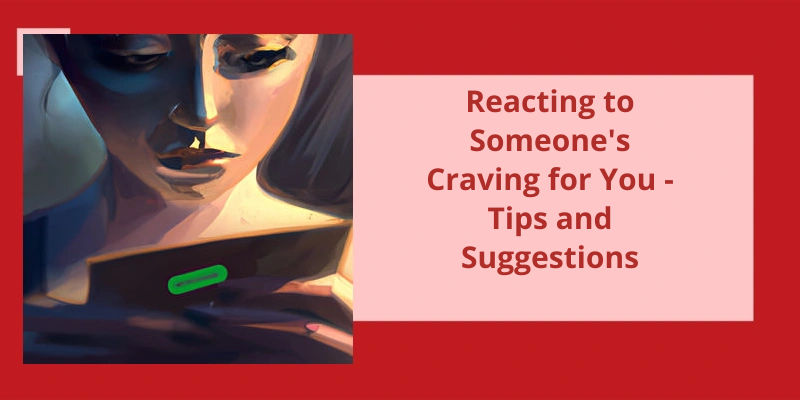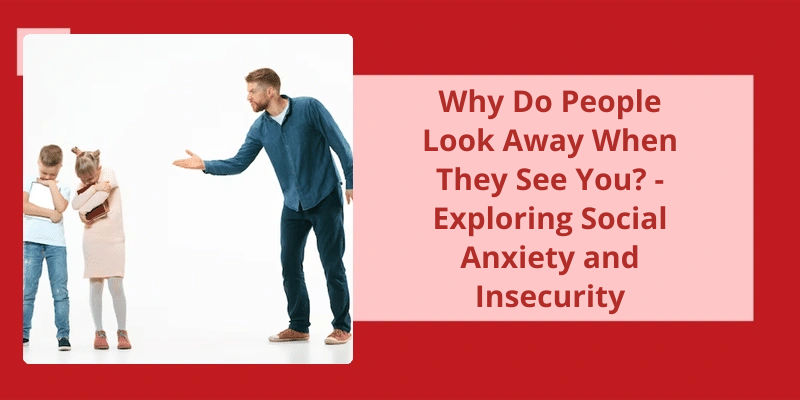Chemistry is a funny thing and it can strike when you least expect it. It's not just a one-way street and often someone could have a crush on you before you even realise it. Sometimes, someone you’ve adored for a long time suddenly confesses how they feel, and other times someone that you've only seen a couple of times suddenly drops the bombshell that they crave you. While it might flatter your ego and make you feel good knowing that someone wants you, how do you respond to this? There are different reactions that you could have in this situation, and the right one depends very much on the relationship that you’ve with the person in question. It’s important to think carefully about how to respond when someone says they crave you, so that you can maintain your dignity while dealing with a potentially awkward situation.
What Does It Mean When Someone Says I Crave You?
When someone says “I crave you,” they’re expressing a deep and intense desire for the person they’re speaking to. This feeling goes beyond simply feeling attracted to someone, as it implies a strong emotional connection that’s been established between two people. This phrase is often used in romantic situations, indicating that the speaker desires the other person both physically and emotionally.
It conveys a feeling of needing someone in a profound way, as though they’re essential to one’s happiness or well-being. When someone says this, they’re essentially saying that they can’t be truly happy or fulfilled without the presence of the person they’re addressing.
It’s a way of communicating that the speaker has fallen deeply in love with the other person and that they can’t imagine being with anyone else. It’s a powerful statement that speaks to the deep connection and bond that can exist between two people who’re in love.
It expresses a desire to be close to someone in a way that’s both physical and emotional, and it implies a level of vulnerability and openness that’s often difficult to achieve in relationships. When someone says this, they’re essentially giving themselves over completely to the other person, trusting them to reciprocate their feelings and desires.
Whether used in a romantic context or not, this phrase speaks to the fundamental human need for intimacy and connection, and it’s a testament to the power of love and desire in our lives.
How to Express Your Craving for Someone in a Healthy Way.
- Communicate your feelings honestly and openly
- Practice active listening when they speak to you
- Show affection through physical touch, such as hugs or holding hands
- Plan activities or date nights to spend quality time together
- Write heartfelt notes or letters expressing your feelings
- Acknowledge and respect their boundaries
- Focus on building emotional intimacy before physical intimacy
- Remember that expressing your craving for someone should never be manipulative or disrespectful
Craving someone is a common emotion that many people experience. It can be caused by various reasons, such as feeling emotionally unfulfilled or yearning for a past memory. Regardless of the cause, it’s important to understand the underlying emotions and address them to avoid any negative consequences. So, if you find yourself craving someone, it’s time to explore why and what you can do to fulfill your emotional needs.
Is It Normal to Crave Someone?
It’s totally normal to crave someone as humans are social animals and crave connection and intimacy with others. Sometimes, these cravings can be a result of unmet needs such as love, support, or attention. Our brains are wired to seek emotional connections, and when those needs arent met, we may feel a sense of longing or desire for someone who can fill that void.
However, it’s important to distinguish between healthy and unhealthy cravings. Healthy cravings for connection and intimacy are normal and natural, and can lead to fulfilling relationships. Unhealthy cravings, on the other hand, can be driven by addiction, obsession, or a need to control the other person. If your cravings are causing you distress or interfering with your life in a negative way, it may be helpful to talk to a therapist or mental health professional.
Cravings can also be a result of past experiences or trauma. If youve experienced loss, abandonment, or rejection in the past, you may develop a craving for someone who can fill that void in your life. This is a natural response, but it’s important to work through past traumas and learn healthy coping mechanisms so that you can build healthy relationships in the future.
Craving someone is a natural human emotion, but it’s important to distinguish between healthy and unhealthy cravings, and to work towards building healthy relationships that fulfill your emotional needs in a positive way. By understanding your own emotions and needs, and seeking support when necessary, you can build the connections and relationships that you need to thrive.
Identifying the Root Causes of Cravings for Someone and Addressing Them Through Therapy or Self-Work.
- Unresolved past traumas
- Lack of affection or attention in current relationships
- Feelings of loneliness or low self-esteem
- Addictive personality tendencies
- Depression or anxiety
- Unhealthy coping mechanisms
As human beings, we’ve a natural desire for connection and affection. Whether it’s through physical touch or emotional intimacy, these interactions bring us comfort and happiness. However, in our society, there’s often a stigma attached to expressing these desires, leading to feelings of shame or guilt. But the truth is, there’s nothing wrong with craving for someone. In fact, it’s perfectly normal and can even have positive effects on our overall health and well-being.
Is It Wrong to Crave for Someone?
However, it’s important to consider who or what you’re craving. If it’s someone who isn’t interested or available, it can lead to disappointment and heartbreak. It’s important to understand and respect boundaries, both your own and those of others. It’s also important to communicate your needs and desires in a healthy and respectful way.
Craving someone can also come from a place of insecurity or low self-esteem. If you feel like you need someone else to validate your worth, it’s important to work on building your own self-worth and confidence. This can involve therapy, self-reflection, and self-care practices.
It’s also important to consider the context and dynamics of the relationship. Is it healthy and mutually beneficial, or are you constantly giving without receiving? Is it based on mutual respect and understanding, or is one person dominating the other?
Overall, it’s not inherently wrong to crave someone. But it’s important to approach it with a healthy mindset and understanding of boundaries and mutual respect. It’s also important to cultivate a strong sense of self-worth and confidence outside of any particular relationship. Only then can you truly enjoy the benefits of physical touch and emotional connection in a healthy and fulfilling way.
How to Differentiate Between a Healthy Craving and an Unhealthy Obsession?
There’s a fine line between a healthy craving and an unhealthy obsession. A healthy craving is a normal desire to consume or engage in a particular activity, while an unhealthy obsession is an intense and uncontrollable preoccupation with something that disrupts daily life. To differentiate between the two, ask yourself if the behavior is causing harm and if you can stop or reduce it. If it’s causing distress or impacting quality of life, it may be an unhealthy obsession.
Source: (21 M) Is it okay to crave a relationship?
Conclusion
It's important to listen to how the other person feels and what their intentions are. If you feel the same way, it's important to express your feelings and communicate openly about what you want from the relationship. However, if you don't share the same feelings, it's important to be honest and communicate your boundaries in a respectful way. Ultimately, it's essential to remember that everyone has the right to make their own decisions about their feelings and actions. The most important thing is to approach the situation with empathy, honesty, and respect for the other person's feelings and boundaries.






